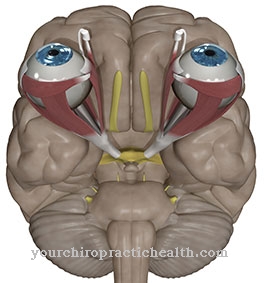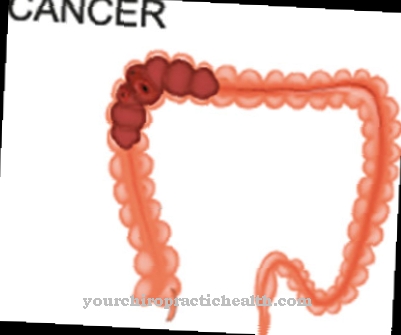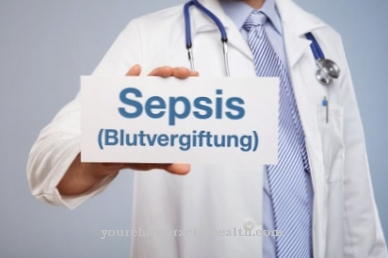The central pontine myelinolysis is a disease in the brain. It's a neurological disorder. It includes damage to the nerve fibers.
What is central pontine myelinolysis?
The central pontine myelinolysis is a rare disease of the nerve fibers in the brain. The covering of the nerves is damaged and causes discomfort. The word "pontine" is derived from the "pons". These are located in the brain and are part of the brain stem there.
The pons are located between the medulla oblongata, also known as the elongated spinal cord, and the midbrain. When looking sideways at the head, they are roughly behind the ears. In the pons, the information from the internal auditory canal and the facial area is recorded and sent to the cerebellum. Forwarded to the cerebellum.
The information recorded by sensors is transported via the nerve fibers in this region. Nerves can be sheathed. This is known as myelination. Myelination ensures that the electrical signals remain within the nerve fiber and can be transported more quickly to the destination.
Without the sheathing, the signals would migrate to the vicinity of the nerve tract. This leads to a reduction in the signal. Central pontine myelinolysis causes the protection of the covering to be reduced or even lost due to damage.
causes
The causes of central pontine myelinolysis include all diseases or disorders that are associated with a change in the concentration of sodium in the organism. Usually it is a so-called hyponatremia. This is an electrolyte disorder that causes a sodium deficiency.
If this state of sodium deficiency persists, central pontine myelinolysis occurs via hyponatremia. The causes of hyponatremia are different. They range from eating disorders and hormone disorders to alcoholism and side effects of medication. In addition, the disease can occur if the infusion therapy is incorrect. Eating disorders such as anorexia often lead to a low-salt diet.
At the same time, sick people consume large amounts of fluids, which in turn lead to the excretion of sodium. Malnutrition and anorexia are characterized by a long course of the disease, so there can be a lack of sodium in the blood. The same applies to alcoholism. Malnutrition also occurs in the course of the disease. This means that the sick person does not consume important amounts of minerals.
Symptoms, ailments & signs
Central pontine myelinolysis leads to nerve damage in the area of the pons. This limits their function. Signals are passed on slowly or do not reach the organ that can identify and process them.
The damage to the nerve fibers leads to discomfort and pain in the head area at the level of the ear. Disturbances or loss of consciousness can occur. Disorientation and confusion are perceived in patients undergoing central pontine myelinolysis.
In severe cases, patients become comatose. The functions of the brain stem are limited in central pontine myelinolysis. This results in circulatory disorders and the associated functional disorders of the brain stem. Eye movements and swallowing are disrupted.
In some cases there are problems with language formation. The articulation changes and the patient has difficulties with voice training. In addition, patients show uncertainty about the gait. Some patients experience paralysis or partial paralysis of the face. In addition, breathing can be paralyzed. This is a life threatening situation.
Diagnosis & course of disease
In the course of the disease there is the possibility of a life-threatening condition. If the condition is properly treated, full recovery can occur. However, full recovery from all symptoms that have arisen is not always given.
The diagnosis is made after other illnesses have been assessed, as well as by imaging methods such as magnetic resonance therapy. If the body gets enough sodium, there is an improvement. The healing period is set between two weeks and a year.
Complications
If central pontine myelinolysis is correctly diagnosed and treated in good time, there are usually no serious complications to be feared. Since this disease is very rare, it is often not recognized or recognized very late. The disease can then take a severe course in which the typical symptoms, in particular pain in the area of the ear, as well as disorientation and confusion, occur more frequently.
The function of the brain stem can be restricted due to circulatory disorders. This can be the language center and the Impair language education. The patient then often has difficulties forming certain sounds, and the vocal pattern often changes.
Problems with swallowing and a resulting impairment in eating are also conceivable. Other possible complications are imbalance, which leads to an unsteady gait, and paralysis of the face. In addition, if breathing becomes paralyzed, the patient's life is in acute danger.
In very severe cases it also happens that patients fall into a coma. A rare but frequently documented complication is the so-called locked-in syndrome. In this case, there is complete paralysis of all limbs, as well as the speech apparatus. The person concerned can usually only communicate with his environment by blinking, although he is mentally fully conscious.
When should you go to the doctor?
Disorders of eating behavior or excessive consumption of alcohol should generally lead to the person concerned seeking medical help. Particularly when destructive behavior increases, there is a risk of health problems that should be counteracted in good time. In the event of disorientation, cognitive disorders or irregularities in blood circulation, a doctor's visit is necessary. Speech problems, unsteady gait, reduced performance or confusion must be examined and treated by a doctor.
Changes in personality, abnormal behavior and irregularities in memory are warning signals that must be investigated as soon as possible. In acute cases, the affected person needs intensive medical care. A doctor should therefore be consulted at an early stage in the event of impaired consciousness. If there is a loss of consciousness, an emergency service must be alerted. Irregularities in the eye movements and abnormalities in the act of swallowing should also be examined.
The person concerned needs help as soon as possible as soon as paralysis or other failures of muscle activity occur. If left untreated or at an advanced stage of the disease, a life-threatening situation can develop. It is therefore advisable to seek cooperation with a doctor as soon as the general state of health deteriorates. Lifestyle changes are necessary so that complications or severe disease can be averted as early as possible. In addition, irreparable damage to the organism can occur at an advanced stage of the disease.
Treatment & Therapy
Spontaneous healing of the central pontine myelinolysis is not known. Even if the sodium content in the blood has a recommended value, the damage to the covering of the nerves is still present. Still, with the right treatment, full recovery can occur.
The process of regeneration takes several months, although with chronic hyponatremia it cannot be assumed that the damage will go away. For this reason, the treatment of central pontine myelinolysis focuses on the symptoms that occur.
In addition, the sodium content in the blood is measured at short intervals and the supply of sodium is precisely monitored. If paralysis of the individual area of the face occurs in patients, these are treated with targeted physiotherapy and appropriate exercises.
If the symptoms of paralysis occur in the respiratory area, the patient is artificially ventilated. If you have difficulty swallowing, a tracheostomy is performed. This is an incision in the windpipe that allows access to the windpipe.
You can find your medication here
➔ Medicines for painprevention
As a preventive measure, the sodium content is measured and checked by regularly checking the blood. The level of sodium in the blood should not be less than 126 mmol / l. In addition, food intake can be used to check that the body is regularly supplied with salty minerals in sufficient quantities. This can be done through food as well as liquids.
Aftercare
People who are suffering or have suffered from the condition should make a significant lifestyle. Since the disease is based on a disturbed eating behavior, those affected should constantly monitor and adjust their diet. However, if there is still malnutrition, the body of those affected must be supplied with sufficient vitamins and nutrients.
In order to achieve permanent relief from the symptoms, a balanced and, above all, healthy diet is very important for those affected. Since the disease is often very stressful, it is advisable to undergo permanent psychological counseling. Many sufferers are often emotionally unstable and cannot cope with the disease on their own and thus achieve an improvement.
For this reason, it could also be helpful for those affected to join a self-help group. There new methods can be learned that should make it easier to deal with the disease. Those affected can also exchange information about the disease with other sufferers there and thus do not feel left alone. Contact with family and relatives is also important.
With the support, those affected can find it easier to cope with the disease and to find a way out. The regular visits to the doctor are mandatory for those affected. Those affected should refrain from consuming alcohol or nicotine.
You can do that yourself
People with central pontine myelinolysis need to review their lifestyle and show willingness for change. The causes of the disease can often be based on eating disorders or an addictive behavior. Therefore, the diet should be controlled and should be optimized if possible. If there is malnutrition, sufficient nutrients and vitamins must be supplied to the organism. A balanced and healthy diet is particularly important for patients in order to achieve relief from their symptoms.
In many cases, parallel psychological support is helpful. Often the patients of this disease are not able to bring about a permanent and stable improvement of their living situation on their own. It is therefore advisable to seek adequate help. Patients should show the will to change and work in a cooperative manner with doctors or specialists. Honesty and the creation of a basis of trust between patient and doctor are of particular importance. Do not consume alcohol or non-prescribed medication. Sufficient fluids should be consumed and periods of rest and recovery should be taken regularly.
It can also be helpful if the options offered for regular health checks are accepted. In this way, changes in health can be analyzed quickly and measures for improvements can be initiated immediately.

.jpg)

.jpg)








.jpg)



.jpg)










.jpg)
